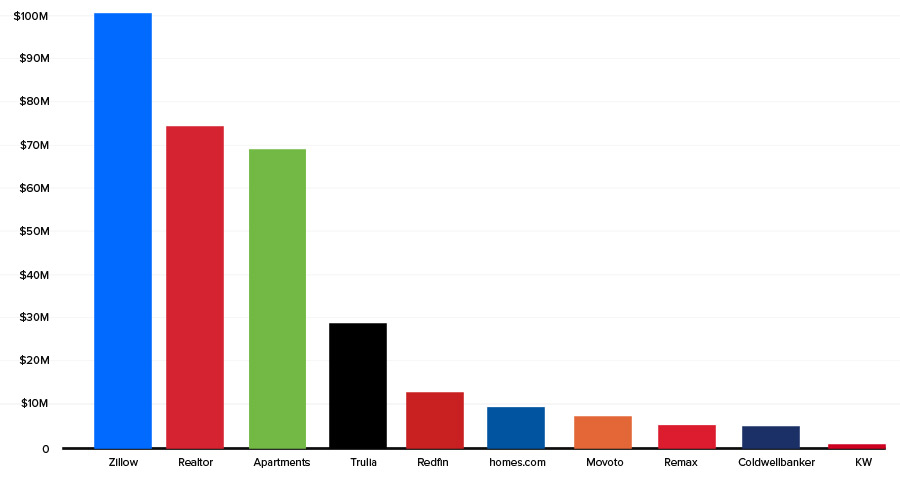
The National Association of Realtors (NSA) reports a whopping 52% of home buyers found their property on the internet. This reveals a critical secret: if you are a real estate agent in 2021, you do not just need a web presence; you need a beautifully designed website that generates qualified and profitable traffic.
What Do Top-ranking Real Estate Sites Implement That You Don’t:
Home sellers and buyers love real estate sites with excellent user experience and those that answer their queries, be it information or property listings. But what do top-ranking real estate sites implement that you don’t? And what can you learn from them? Read on to get answers to these questions and more.
- How Much Monthly Traffic Do Top Real Estate Websites Record?
- Where Do These Websites Get Their Traffic?
- Blogs and Traffic
- Befriend Google to Drive Traffic to Your Real Estate Website
- Should You Eliminate Facebook from Your Marketing Strategy?
- Build a Real Estate Website that Works for You
How Much Monthly Traffic Do Top Real Estate Websites Record?
The following is a list of the best-performing real estate sites and their monthly traffic:
- Zillow.com: 103.5m
- Realtor.com: 74.3m
- Apartments.com: 69.4m
- Trulia.com:28.4m
- Redfin.com: 12.1m
- Homes.com: 9.7m
- Movoto.com: 6.4m
- Remax.com: 5.65m
- Coldwellbanker.com: 5.25m
- KW.com: 395k
From the above figures, it is easy to conclude that an incredible amount of traffic lies in wait for real estate agencies willing to go the extra mile in their digital marketing strategies.

Where Do These Websites Get Their Traffic?
Looking at some websites mentioned above, 41.9% of Zillow’s traffic comes from organic search, while merely 2.5% comes from social media. Trulia.com, Redfin.com, Realtor.com, and Apartments.com obtain 57.55%, 38.89%, 54.17%, 67.04% of their traffic from organic searches. Less than 3% of the traffic comes from social media while search contributes less than 2%.
If you search for real estate terms, for instance, Los Angeles real estate and Florida real estate, it is not surprising that at least 5 of these sites will feature in search engine’s first page results. Undoubtedly, Google is the primary source of traffic for the top players.

However, these figures should tempt you to do away with your social media efforts. While social media can give you that traffic spike, Google should be your best friend when driving consistent traffic to your real estate website. In the next section, we will discuss how Facebook, blogs, and Google influence traffic generation for real estate websites.
Blogs and Traffic
Best-performing real estate websites understand that Google loves valuable content. For this reason, they do not shy away from investing their time and money in blogs. Their frequency of publishing blogs attests to this statement. Zillow, Realtor, Redfin, Trulia, and Movoto publish 10, 40, 10, 50, and 11 blogs weekly, respectively. Therefore, you cannot afford to underestimate the correlation between blogging and the amount of traffic these sites derive from Google.

Blogging helps you drive traffic to your website in two primary ways. First, a blog acts as a frequent update to your website, focusing on topics online shoppers are looking for. Target prospects find your articles when searching for these topics online.
Secondly, blogs generate traffic via social media. Most likely, your real estate company has a social media account. But what content are you offering your social media community? Whereas it is essential to post pictures of fantastic homes and satisfied homebuyers, real estate prospects are also looking for helpful and engaging content that resonates with their needs. Content that people not only love but also happily share. By sharing your blogs on social media, you invite new prospects to your website. And when visitors love your web content, they will be more than willing to share it on social media.

Blogging saves you from the trap of making your website appear like one big online banner advert. You do not want to scare away potential clients with an excessively salesy website. Demonstrate your real estate expertise and build trust and confidence with a regularly-updated and helpful blog page.
Something else interesting about a blog is that it serves as your 24/7 marketer, connecting with potential clients and answering their questions-whether you are enjoying a much-needed break or getting some good sleep. And compared to other marketing techniques, blogging is way cost-effective as a long-term strategy.
All in all, generating qualified leads with blogging boils down to selecting the right topics. Best ideas to leverage for your blog include addressing common challenges facing the local housing market, covering local events, writing about market insights, and building topics around online queries or questions you hear from your clients.
Befriend Google to Drive Traffic to Your Real Estate Website
Cognizant that top-rated real estate websites derive their traffic from Google, how do you compete with them? That sounds scary, but there is an easier way out- keyword stacking. Keyword stacking is among the best ways to rank favorably on Google result pages for long-tail or low volume keywords.
Keyword stacking is unlike keyword stuffing, which is synonymous with websites too focused on ranking for particular terms, consequently stuffing their content with the targeted phrases. The kind of websites purely built for Google and not the actual visitors. Keyword stuffing makes your content sound unnatural and often does more harm than good-it reduces engagement and conversions, increase your bounce rate, and incredibly hurts your website’s credibility. So, avoid this tactic at all costs.
In keyword stacking, you concentrate on long-tail or highly relevant search terms rather than the general terms the big sites are already ranking for. Long-tail keywords are three to four search phrases specific to the real estate service or products you sell. These terms are particularly useful because prospects tend to be quite precise when searching for properties online.
Rather than spending valuable time trying to rank for broad and general keywords in the real estate industry and stuffing your website with the terms to manipulate Google rankings, focus your energy on more specific terms to compete with the big boys. So, instead of focusing on keywords like “real estate,” “real estate agent,” “housing market,” and other broad terms, you use phrases like “single-family homes for sale Calabasas, CA,” “Westlake luxury condos for sale,” etc.
Even as you play around with long-tail keywords, do not forget the importance of creating content that catapults readers your way.
Should You Eliminate Facebook from Your Marketing Strategy?
It is essential to build a Facebook page for your company, but you want to avoid spending too much energy trying to engage your social followers.

Let us have a look at what the big boys are doing on social media. Zillow has about 2.45m followers on Facebook, but its posts record about 10k engagements. Trulia boasts 469k Facebook fans but with an incredibly low engagement level of about 150 in each post. You will note that the top real estate sites use Facebook primarily for advertisement while spending more resources generating traffic with Google. When trying to send traffic to your real estate website, the rule of thumb focuses on Google first and then social media.
Build a Real Estate Website that Works for You
Are you struggling to send traffic to your real estate website? Strategic Agent can help with an intuitive, attractive, and mobile responsive website that captures incredible traffic and nature visitors into leads and paying customers. Reach us via 805-413-7895 or message us online to schedule a free consultation with our website experts or learn more about our web design services for real estate agents.
